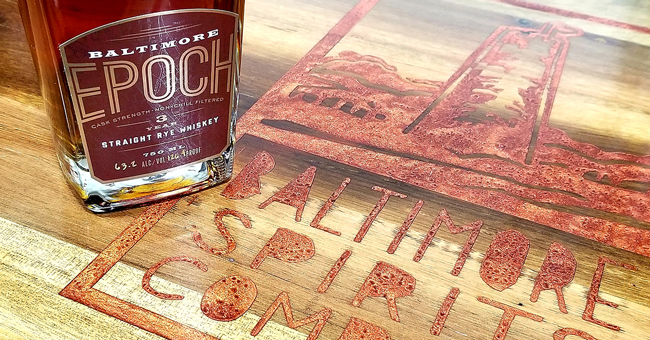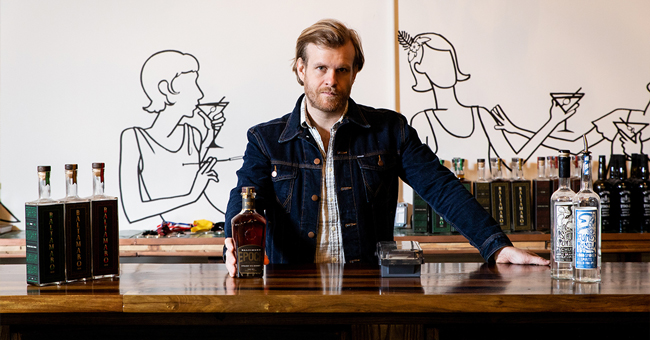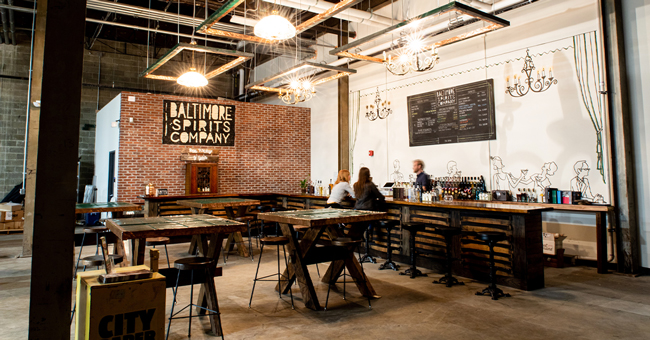In speaking with Max Lentz, it’s clear that the Texas native has a deep appreciation for his adopted hometown. Having attended college around 15 minutes north of the city at Goucher College, he recalls “falling in love” with Baltimore during his post-grad summer spent in the Bolton Hill neighborhood, where he found a thriving creative community and DIY spirit anchored by nearby Maryland Institute of Contemporary Art (MICA).
On the subject of the state’s place in the history of spirits production, he speaks with pride about being part of a spirits renaissance in “one of the absolute cradles of American distilling.” As interest in local craft distilling has risen, he added, Baltimore has become the home of “world class cocktail bars” backed by renowned mixologists.
In many ways, it’s a scene that has been replicating in cities across the country, recalling the early years of the craft beer boom. Post-industrial cities, buoyed by the influx of a young creative class looking for a more affordable urban experience, have become fertile ground for startup distilleries to grow. Yet despite sharing similar stories to entrepreneurs in places like Ohio or Michigan, for Max and his team all roads lead back to Charm City.
“We’re in kind of a resurgence but we don’t necessarily consider it the same thing as the nationwide move to micro-distilling as much as it is this return to Maryland’s roots,” he said. “If you go back, there were so many distilleries in the state that everyone was pushing for differentiation, and there was always a creative struggle in the distilling scene to create people’s own identities. We feel like we are part of that, and I think that kind of reflects Baltimore in a really natural sense.”
As a reflection of its place in the state’s distilling diaspora, Baltimore Spirits Co., now in its sixth year, has evolved beyond its initial release in 2015: its flagship Epoch Rye Whiskey, the first to be distilled in the city in over 50 years, according to Lentz. At the time that expression was launched, the company was still finding its footing and refining the vision of the brand, having stepped into the venture with the basic idea of a business centered around art and creativity.
But as one of just a handful of distillers in Maryland at the time, there weren’t many local points of reference for Lentz and his co-founders to learn from. Instead, the group took inspiration from scotch makers and the hyper-detail oriented work of Japanese distilleries. That means a decidedly “old school” approach, in Lentz’s words: Rather than a hybrid or column still, they built a small all-copper pot still and open-top fermented in wooden vats. They decided early on not to do any short aging in small barrels, instead aging its whiskey in 53 ounce barrels for two years.
Much like the city from which it takes its name, Baltimore Spirits Co.’s philosophy is steeped in history yet unafraid to shake things up when needed. Lentz is mindful of the region’s deep roots in distilling: pre-Prohibition, Maryland was recognized for its unique style as the third-largest rye whiskey producer in the U.S, behind only Kentucky and Pennsylvania. While Epoch Rye is a clear nod to the slightly sweeter Maryland-style whiskey, it’s distilled like a traditional single malt.
“We’re known for detail oriented, creative spirits making,” said Lentz. “It’s not stuff that pushes boundaries just for the sake of doing ‘weird’ stuff. But it’s really a reflection of who we are that most things are not historic interpretations of their category. We like to pull in history and incorporate it but we don’t feel like anything is worth doing if we can’t push it into a new space and give it some kind of identity.”
Having seen Epoch Rye gain a warm reception upon its release, Lentz and company have continued to build the Baltimore Spirits Co. portfolio by following their instincts. The label spent two years developing its second release and first un-aged spirit — Shot Tower Gin, named after a 19th century city landmark — and followed that with two apple brandy products, a spirit and a liqueur. In 2o18, the company moved out of its original location to join Union Collective, a retail and manufacturing space exclusively for independent local businesses in the city’s Hampden neighborhood.
In taking such a local-focused approach, Lentz acknowledged that Baltimore Spirits Co. is perhaps not built for rapid scaling. Outside of its hometown, the label has been deliberate in its growth, working closely with beverage programming directors and mixologists in cities with developed cocktail scenes, including Seattle, San Francisco, Chicago, Los Angeles and New Orleans. Revived interest in Maryland-style whiskey amongst aficionados and bartenders has helped drive awareness for local distillers like Baltimore Spirits Co., along with the likes of Sagamore Spirits and Old Line Spirits. Meanwhile at home, though perhaps outpaced by the explosion of craft beer, the continued resurgence of Baltimore’s own cocktail scene has Lentz feeling inspired: “It’s nothing like it was even a decade ago,” he said. Case-in-point: a law barring distilleries from serving alcoholic drinks on-site was lifted in 2019, clearing the way for Baltimore Spirits Co. to open its own tasting room and design-your-own-whiskey visitor experience when conditions permit.
In reflecting on those past ten years in Baltimore, Lentz often returns his original attraction to the city: the energy of a vibrant, mutually supportive creative community. For its part, Baltimore Spirits Co. is working with MICA on a student grant to help local visual artists.
“We all kind of consider ourselves part of the same community, and of course you see a lot of musicians and visual artists who in one way or another end up behind the bar or in the service industry,” he said. “The creative industry behind the bar and the more literal arts community really blend into each other around here.”


